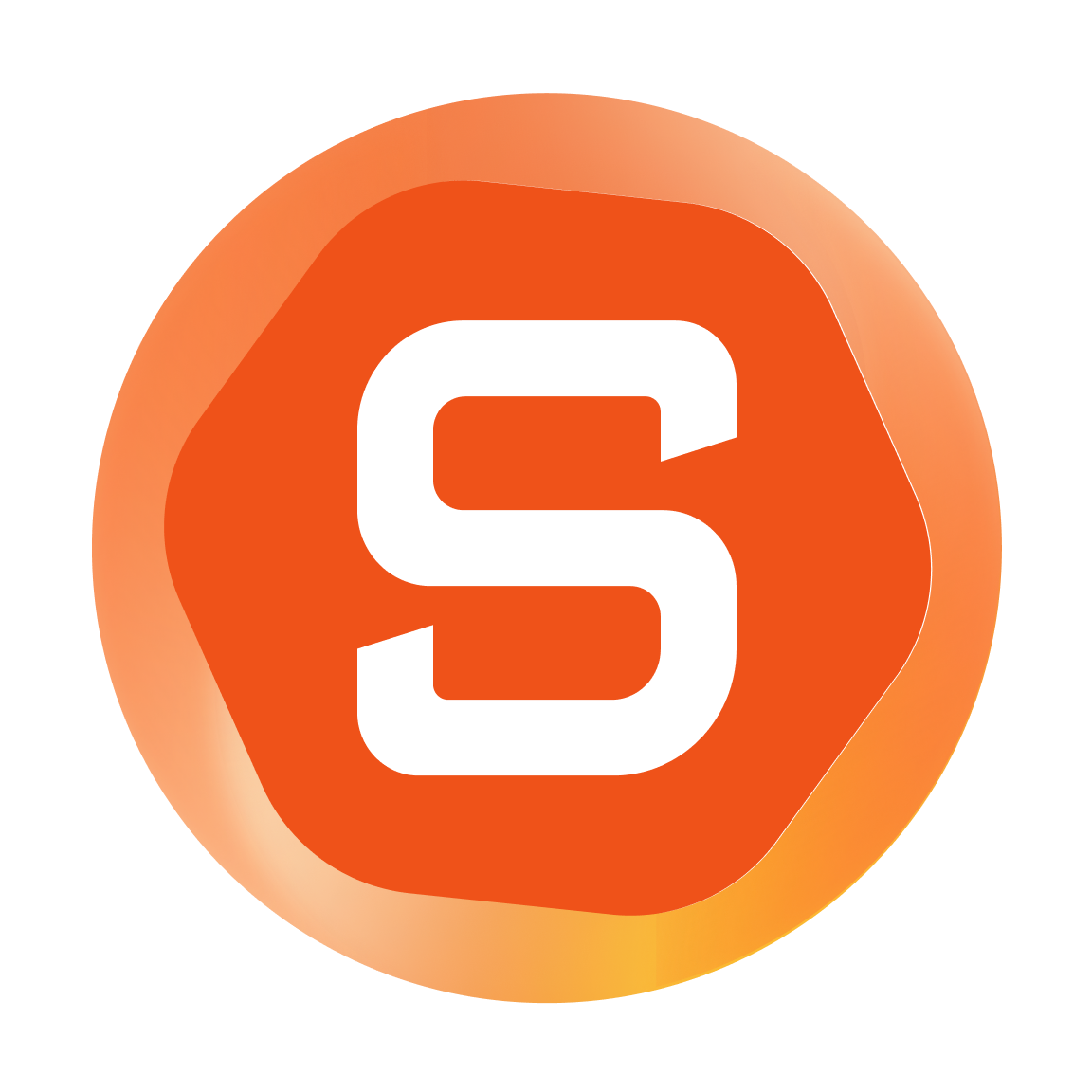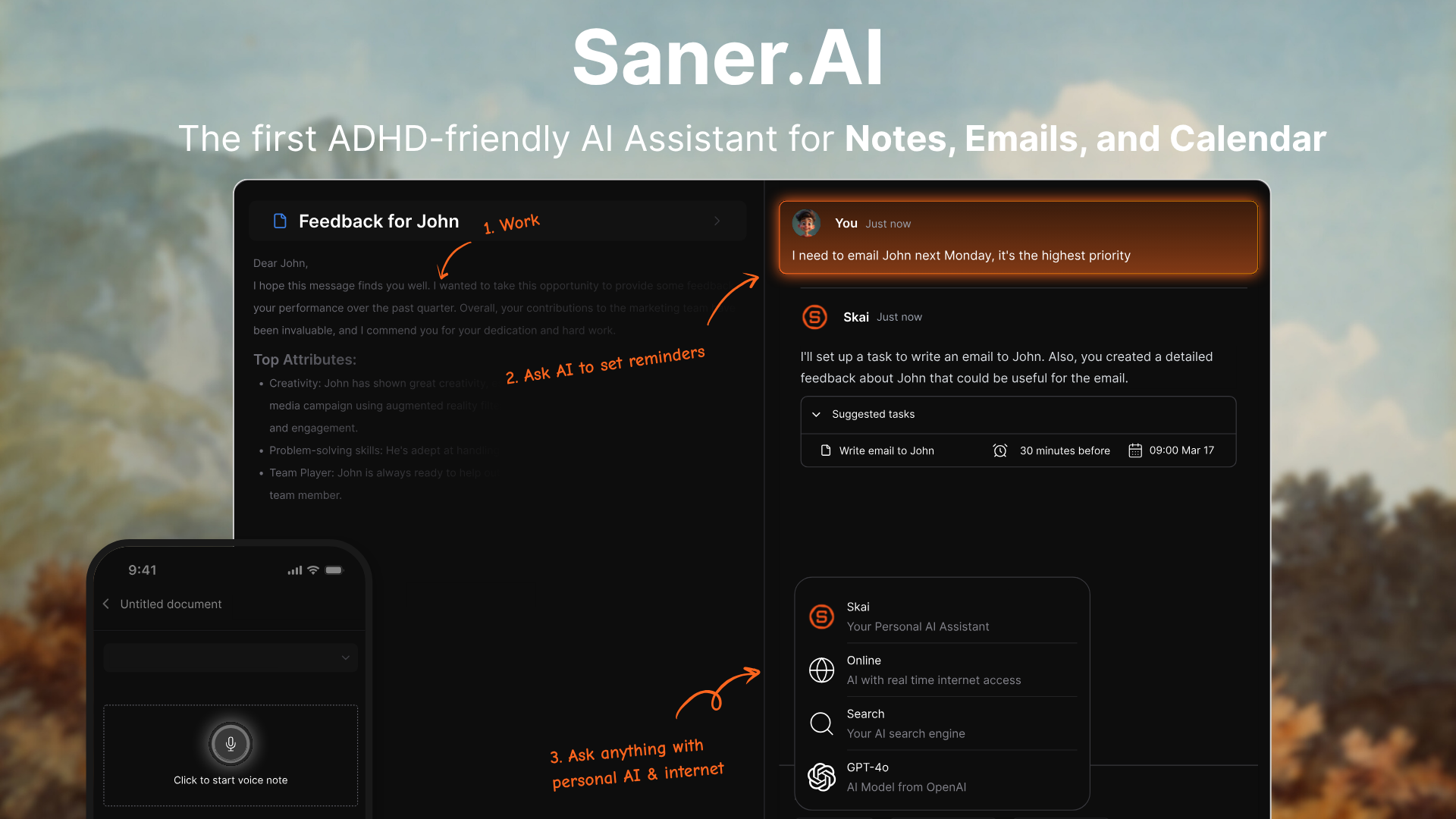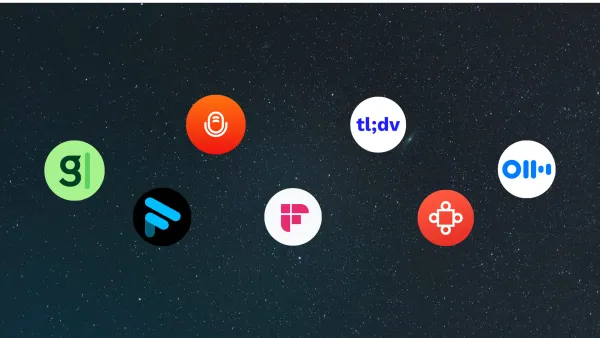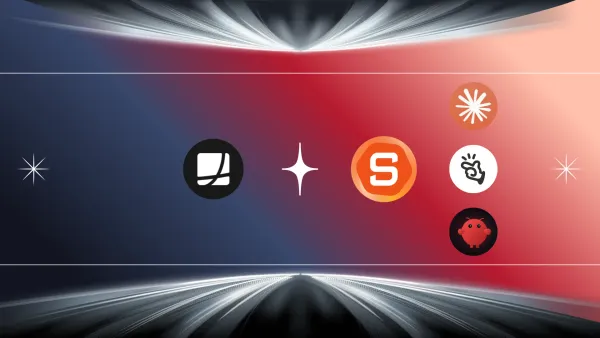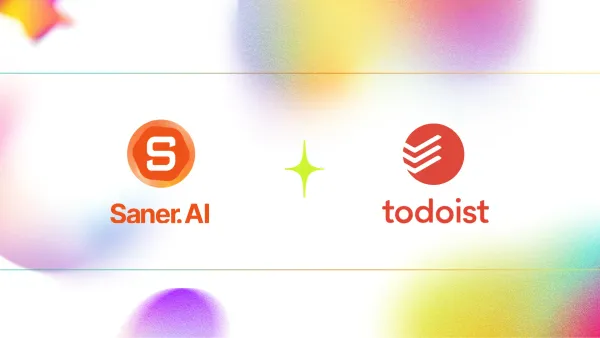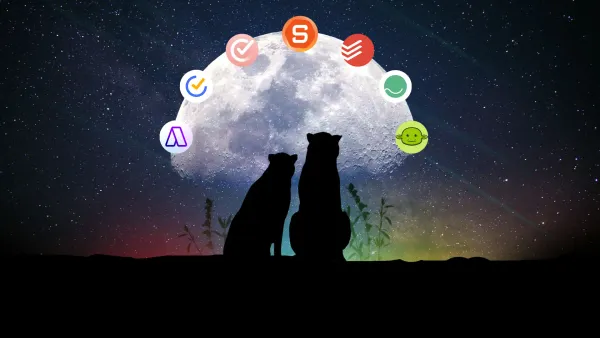We Tested 18 ChatGPT Alternatives. Here are the Best 9
The Best ChatGPT Alternatives are: Saner.AI, Gemini, Claude, Grok, Copilot, Pi, Perplexity, Deepseek, and Meta
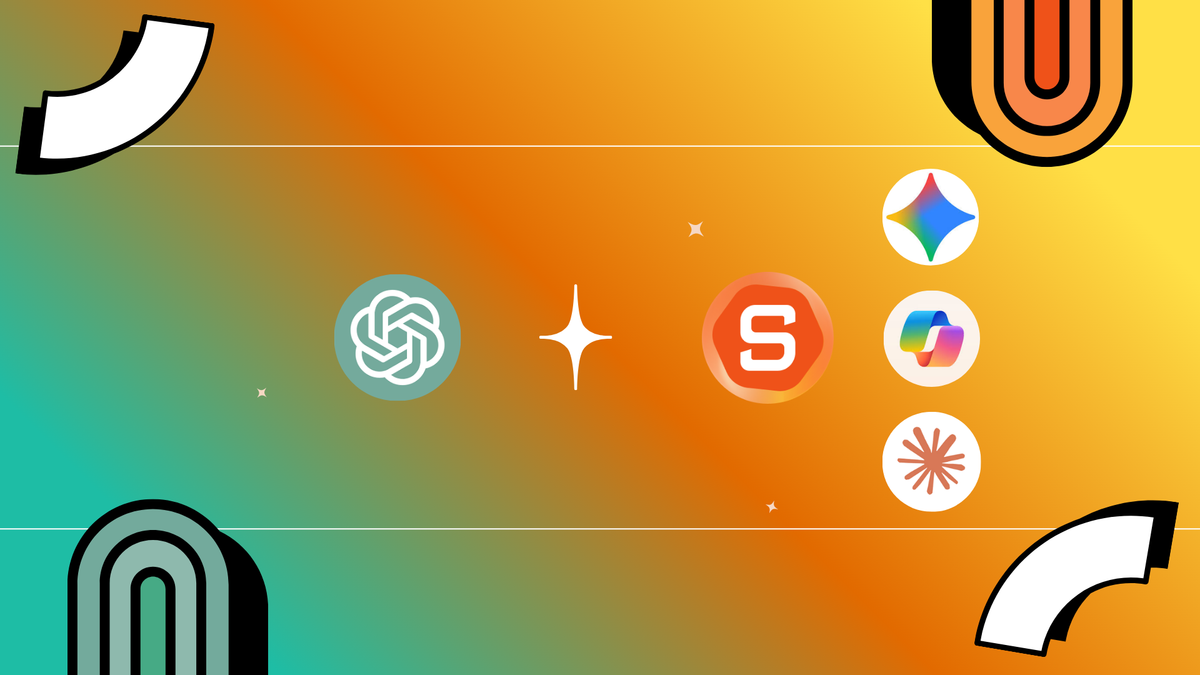
We Reviewed the 9 Best ChatGPT Alternatives in 2026
If you’ve ever typed a prompt into ChatGPT and thought “This is good… but it could be better,” you’re not alone.
ChatGPT changed how we work, write, research, and create - but it’s not perfect.
Enter the world of “Best ChatGPT Alternatives”: a growing field of AI chat tools that aim to fill the gaps that ChatGPT leaves open (cost, context-memory, integrations, specialized use-cases).
In this post, we’ll walk you through the top free & paid ChatGPT alternatives in 2026 - what they are, how they compare, what they do better (or worse).
Whether you’re a marketer, creator, researcher, or team-lead, you’ll get a clear view of apps like Saner.AI, Gemini, Claude, and more - and how to pick the right one for you.
What Makes a Great ChatGPT Alternative?
Here are some of the key criteria:
| Feature | Why it matters |
|---|---|
| ✅ Accuracy & Reasoning | The ability to handle complex prompts, logic, nuance. |
| ✅ Context/Memory | Can it remember prior chats, maintain topic continuity? |
| ✅ Speed & Scalability | Quick responses, good for real-time work and larger tasks. |
| ✅ Usability/UX | Interface is intuitive, minimal friction for non-tech users. |
| ✅ Integrations | Plays nicely with your tools (docs, email, Slack, calendar). |
| ✅ Affordability | Free tier + good value paid plan. |
| ✅ Privacy/Security | Data-handling clear and safe, especially for work/professional use. |
We’ll keep these in mind as we jump into the reviews.
How I Researched & Tested These Tools
I spent weeks testing and comparing ChatGPT alternatives across real-world scenarios - from writing and planning to team workflows. Here’s what I focused on:
- Features: How well each tool handles reasoning, summarization, and complex planning.
- Usability: Whether the chat feels fast, intuitive, and free from friction or overwhelm.
- Integrations: How smoothly it connects with tools like Google Drive, Slack, Notion, and email.
- Pricing: The real value you get from free tiers versus paid plans.
- Use Cases: How each tool performs for solo productivity, deep research, team collaboration, and ADHD-friendly workflows.
This hands-on approach helped me see which AI chat tools actually fit into daily work - not just look good on paper.
Now, let's dive in!
What Are The Best ChatGPT Alternatives in 2026?
The Best ChatGPT Alternatives are: Saner.AI, Gemini, Claude, Grok, Copilot, Pi, Perplexity, Deepseek, and Meta
🧠 Best ChatGPT Alternatives (2026 Comparison)
| Tool | Free Plan 💸 | Strengths ⚡ | Best For 👤 |
|---|---|---|---|
| Saner.AI | ✅ Yes | Task/workspace + AI chat | Professionals, knowledge workers |
| Gemini | ✅ Yes (limited) | Multimodal, enterprise-grade | Teams, power users, enterprise workflows |
| Claude | ✅ Yes | Strong writing/conversation + safety | Writers, marketers, creatives |
| Grok | ✅ Varies | Good factual/research reliability | Researchers, academics |
| Microsoft Copilot | ✅ With MS365 | Seamless Microsoft ecosystem integration | Businesses using Microsoft apps |
| Pi | ✅ Yes | Friendly, natural conversational tone | Individuals, creatives |
| Perplexity AI | ✅ Yes | Real-time web answers + citations | Students, researchers |
| DeepSeek | ✅ Varies | Research-focused, high accuracy | Science / academic users |
| Meta (AI chat) | ✅ Varies | Mobile / social-first with huge scale potential | Mobile-first enterprises and social workflows |
1. Saner.AI
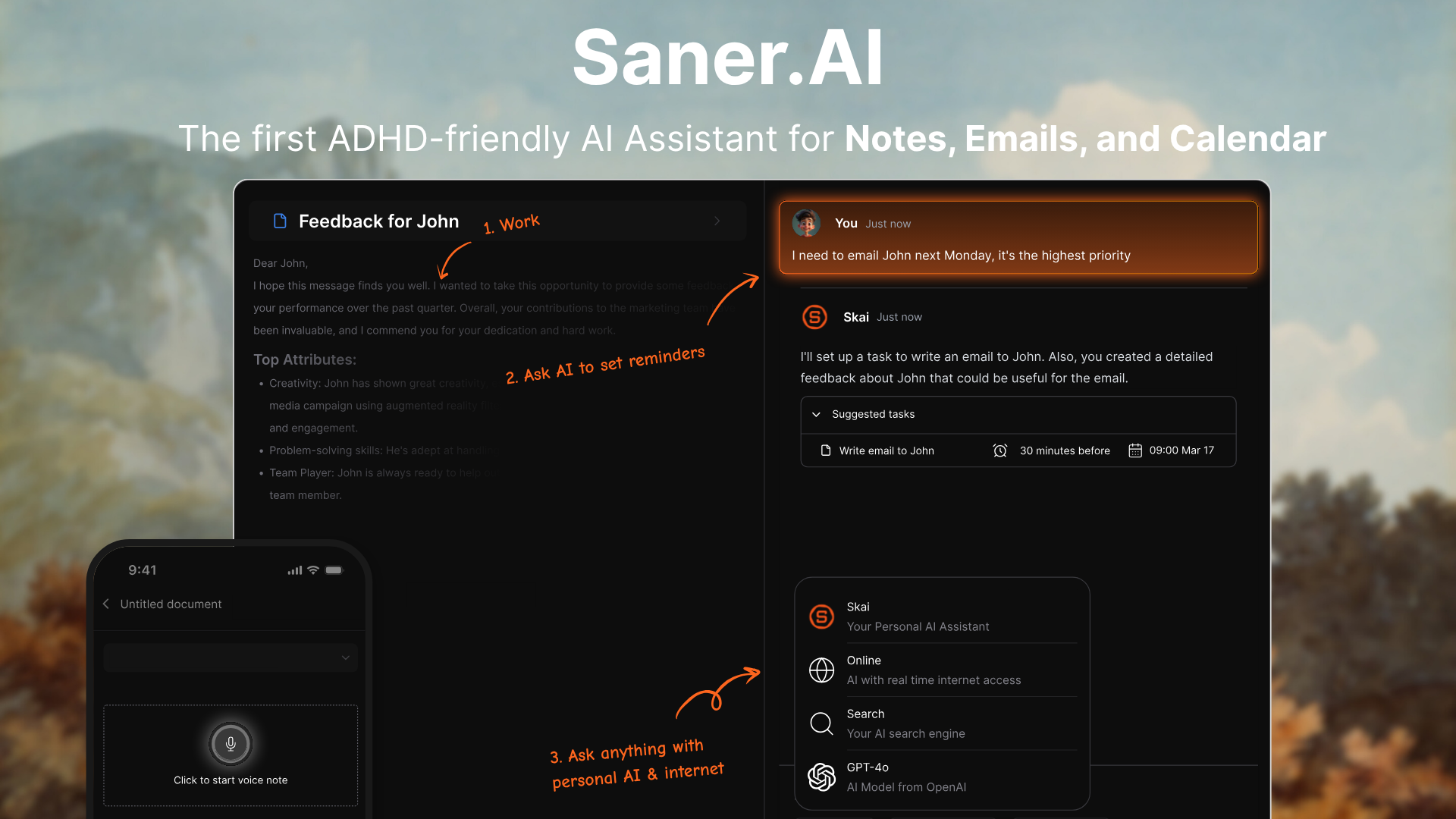
Saner.AI is an intelligent AI assistant that helps you organize your entire workflow - notes, tasks, calendar, and emails - in one calm workspace. Unlike ChatGPT, Saner.AI helps you turn ideas into action without getting lost in dozens of apps
Key features
- Chat-first interface - manage notes, tasks, and calendar by simply talking to your AI assistant.
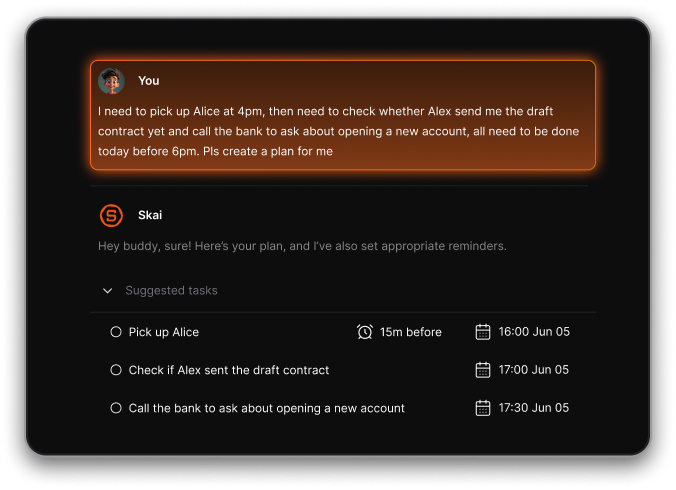
- AI Workspace: Combines chat, notes, tasks, and calendar into one intelligent interface
- Day Planner: The AI turns your tasks into a daily plan that fits your schedule and personal priorities.
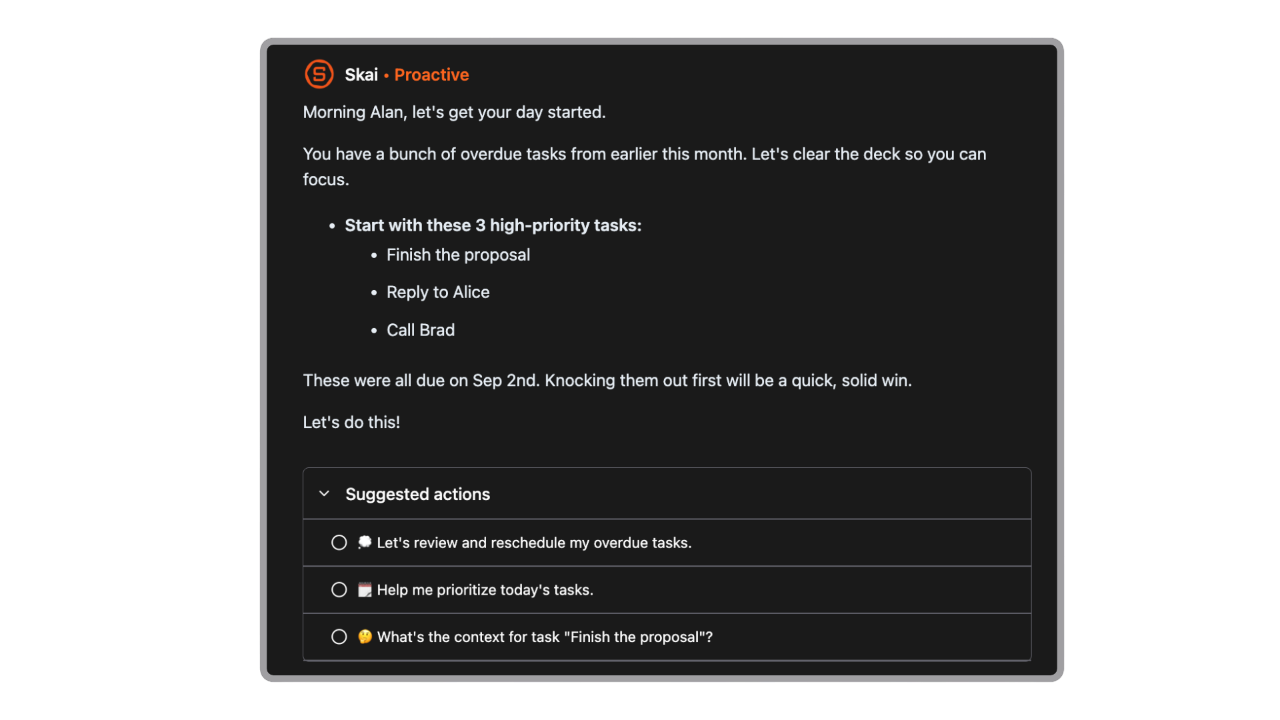
- Task Extraction from Notes & Emails: Saner automatically finds to-dos from your messages, notes, or calendar events and adds them to your task list.
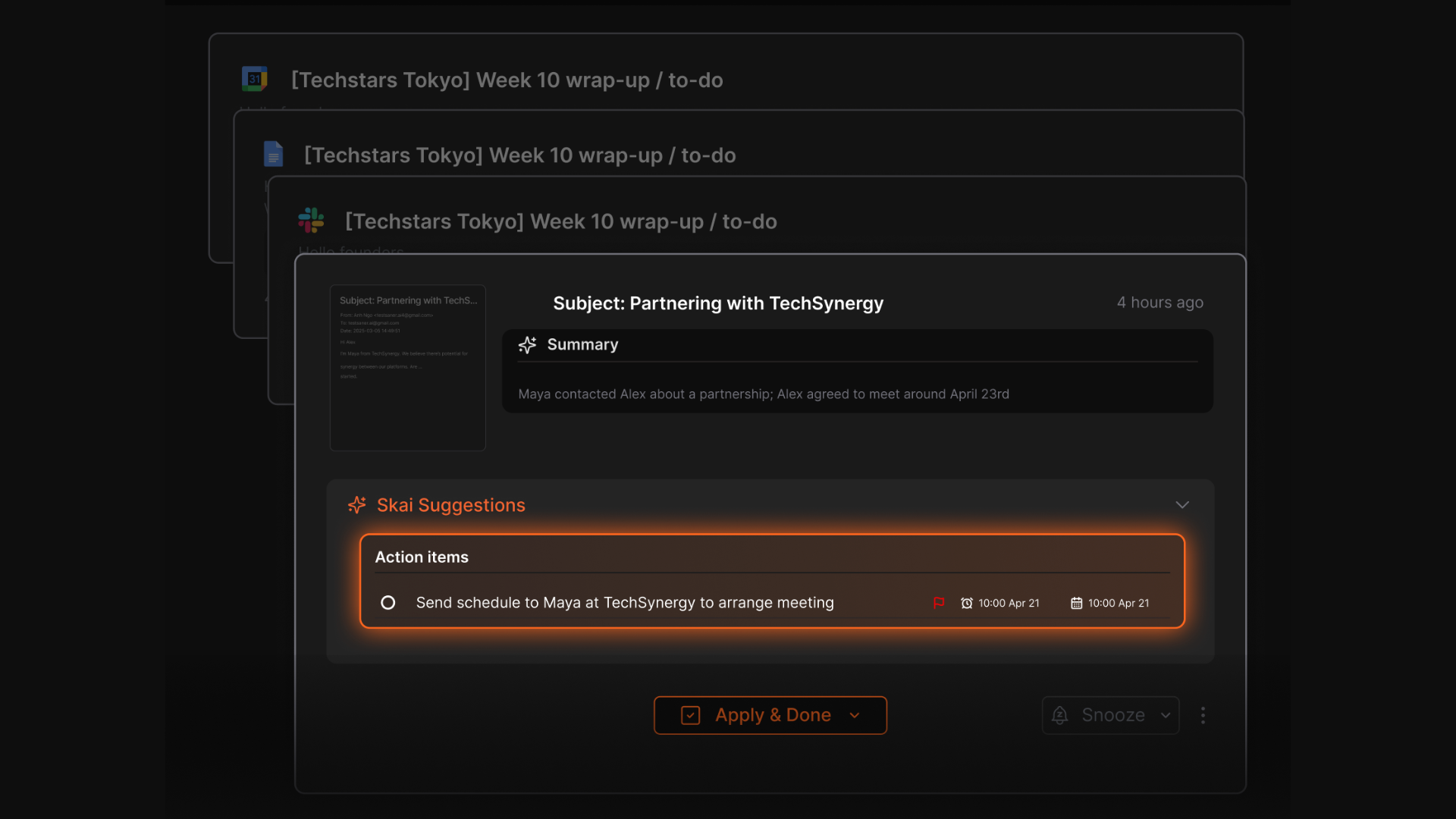
What I liked
- I like the “Ask AI” feature - you can have natural conversations with your own notes, thoughts or tasks
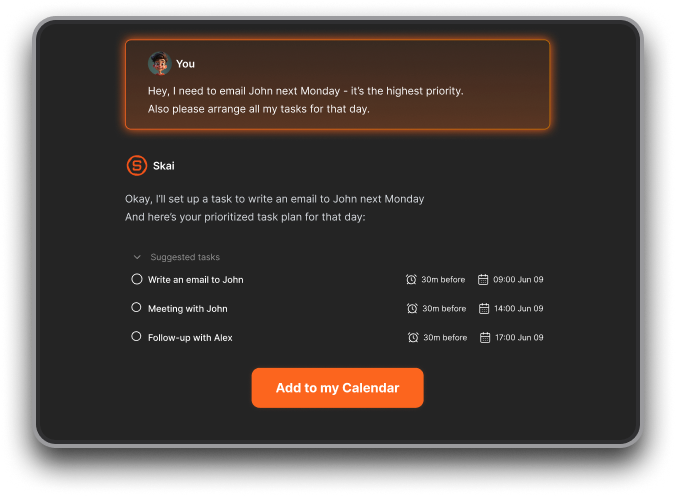
- I like that it helps you plan your day automatically, something ChatGPT doesn’t do
- I like the ADHD-friendly experience - clean, calm, and supportive without overwhelming you with notifications or tabs.

Cons
- Requires internet access for full functionality
Saner.AI Reviews

Pricing
- Free
- Starter: Monthly at $8/month, Annually at $6/month (with early user discount)
- Standard: Monthly at $16/month, Annually at $12/month (with early user discount)
Who is it suitable for?
- Entrepreneurs, researchers, and professionals who want a ChatGPT alternative that manages notes, tasks, and calendar together
- ADHD-prone or easily overwhelmed users who prefer structure without chaos
- Teams or solo users who want to reduce context switching and mental clutter
- Anyone looking for an AI that not only chats, but helps them plan, focus, and follow through
How to start using it?
- Go to saner.ai and create a free account
- Connect your email, calendar, and notes to let Saner organize everything automatically
- Try asking: “Help me plan my day based on my tasks”
Work more efficient with your top ChatGPT Alternative
2. Google Gemini

Google Gemini is Google’s flagship AI assistant designed to compete directly with ChatGPT. It combines Google’s deep search intelligence with advanced reasoning, multimodal understanding, and tight integration across Workspace apps like Docs, Gmail, and Sheets
Key features
- Advanced reasoning: Gemini 2.5 Pro can handle complex math, coding, writing, and research tasks with exceptional depth and context.
- Multimodal input: Accepts text, images, voice, and even video, making it one of the most versatile AI chat tools available.
- Google integration: Works seamlessly inside Gmail, Docs, Sheets, and Search, turning them into AI-powered productivity tools.
What I liked:
- The reasoning power is top-tier - it can manage advanced queries, from scientific research to startup planning, without losing coherence.
- Gemini’s multimodal capability - you can upload an image or diagram and ask it to explain or improve it.
- The free version is surprisingly capable
What I disliked:
- It can feel overwhelmingly broad
- Some of the most powerful features (like Gemini Ultra) are locked behind higher-tier pricing, more suitable for enterprises.
Pricing:
- Free plan available with basic capabilities.
- Gemini Advanced (Pro): Around $19.99/month
- Gemini Ultra: Around $249/month
Suitable for:
- Professionals and teams who rely on Google Workspace
- Writers, researchers, and developers who need long-context reasoning and multimodal input in one tool.
How to start:
- Go to gemini.google.com and sign in with your Google account.
Google Gemini review (source)

3. Pi
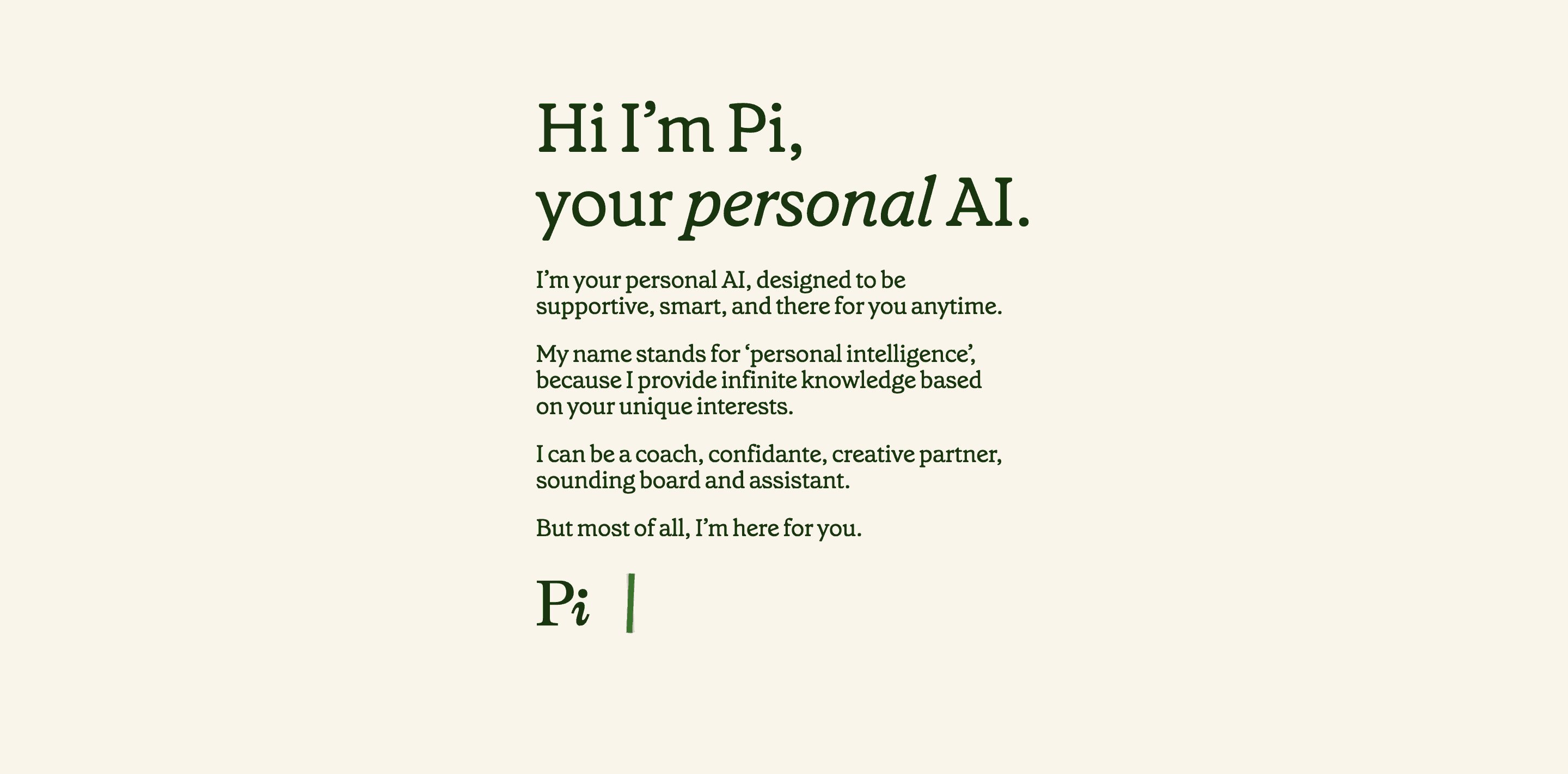
Pi.ai is an empathetic AI assistant that feels more like a thoughtful companion than a traditional assistant. Instead of just giving you answers, Pi focuses on empathy, active listening, and conversation that helps you think through problems, reflect on emotions.
Key features
- Conversational and friendly tone that feels like chatting with a supportive friend
- Learns your preferences over time to make responses more personal
- Free access with no paywall or account upgrades required
- Available on web, iOS, and Android (in select regions)
What I liked
- I like how natural and human the conversation feels
- It’s emotionally intelligent and patient
What I disliked
- No integrations with external tools (like Notion, Gmail, or Calendar), so you can’t use it for workflow automation.
- Not suited for research, productivity, or task management
Pricing
- Free to use with no premium tiers or hidden upgrades
Suitable for
- People who want a friendly, conversational AI companion instead of a productivity tool
- Users looking for emotional support, brainstorming, or personal reflection
How to start
- Visit pi.ai or download the Pi app on iOS or Android
Pi.ai reviews (source)

4. Claude

Claude is Anthropic’s flagship AI assistant designed to be one of the smartest and safest ChatGPT alternatives. It feels less like a chatbot and more like a collaborator that can think deeply, handle large documents, and reason through complex problems
Key features
- Deep reasoning engine that handles long-form prompts, documents, and even code with impressive accuracy
- Supports uploads like PDFs, images, and text files for analysis, summarization, and brainstorming
- Multi-model system: Haiku (fast), Sonnet (balanced), and Opus (deep reasoning) to match your task type
What I liked
- Handles very long context - you can upload large files or entire project notes, and it still keeps track of everything coherently
- Its tone is polite, calm, and well-structured - ideal for professionals and teams who value reliability and precision
What I disliked
- Mobile and voice mode features are still rolling out, so not all regions have full functionality yet
- Less suited for people who just want quick, casual chat responses - it’s designed for deeper reasoning rather than simple Q&A
Pricing
- Free plan available with basic features and limited usage
- Paid plans start around $20/month
Suitable for
- Professionals, creators, and researchers who want a more analytical and reasoning-focused AI
- Teams that need a reliable ChatGPT alternative that can handle long context and structured workflows
How to get started
- Visit claude.ai and sign up for a free account
Claude reviews (source)

5. Grok

Grok is an AI assistant built as a bold, conversational alternative to ChatGPT, designed to be more “human,” witty, and real-time aware. Unlike other chatbots that rely only on static data, Grok connects directly to the X (formerly Twitter) platform
Key features
- Real-time knowledge: Pulls insights directly from the web and X platform, keeping its responses current.
- Creative generation: Supports text-to-image creation (and soon, video) for meme making, visuals, and social content.
- Multi-model system: Offers different versions like Grok-2 and Grok-3, each with improved reasoning and context understanding.
What I liked
- I like that Grok feels alive - it actually understands what’s trending today, which makes it great for brainstorming social posts, memes, or timely commentary.
- It’s one of the few ChatGPT alternatives that integrates directly with a major social network, giving it a clear edge for creators and marketers.
- The AI can joke, debate, and provide insights with personality instead of a corporate filter.
What I disliked
- It sometimes prioritizes humor or speed over accuracy, which can make its responses less reliable for professional or research-level tasks.
- The edgy personality can be hit-or-miss - great for casual users, but not ideal in formal contexts.
- Limited integrations with external productivity tools like Notion or Google Workspace.
Pricing
- Free access available with limited usage on the X platform
- Premium tier around $30/month
Suitable for
- Content creators, marketers, and social-media managers who want an AI that stays up to date with trends
- Users who prefer a conversational, fun, and slightly rebellious AI personality
How to start
- Go to the X app or website and find Grok under the xAI section
- Sign in using your X account and start chatting for free
Grok review (source)

6. Microsoft Copilot

Microsoft Copilot is an AI assistant that brings generative AI directly into your daily tools like Word, Excel, Outlook, and Teams. Instead of switching between apps, you can write, analyze, summarize, and automate right inside your existing workflow. It’s one of the best ChatGPT alternatives for professionals and teams who live in the Microsoft ecosystem
Key features
- Seamlessly integrates across Word, Excel, PowerPoint, Outlook, and Teams to help draft content, summarize meetings, generate formulas, or organize information.
- Uses Microsoft’s AI models with live web grounding to give you more current, factual, and context-aware responses.
- Supports “role-based” Copilots for business functions like sales, service, and finance, allowing tailored experiences.
What I liked
- Deeply integrated - you don’t have to leave Microsoft apps to use it
- The enterprise-grade security makes it a trustworthy AI solution for corporate environments.
What I disliked
- The pricing can feel steep, especially since it’s an add-on to existing Microsoft 365 subscriptions.
- Some advanced features, like domain-specific Copilots or extended usage, are locked behind higher-tier plans.
- It’s not ideal for creative or casual chat use
Pricing
- Free access is limited to basic features depending on your Microsoft plan.
- Individual users can get Microsoft 365 Premium with Copilot included for around $19.99/month.
- Business and enterprise users can add Copilot to Microsoft 365 for about $30/user/month.
Suitable for
- Organizations that need enterprise-level AI with security, compliance, and admin controls.
- Business leaders, analysts, and executives who need help summarizing, drafting, and analyzing across documents, data, and meetings.
How to start
- Make sure you have an active Microsoft 365 subscription (Personal, Business Standard, E3, or E5).
- Go to your Microsoft 365 settings to activate Copilot or upgrade to a plan that includes it.
Microsoft Copilot reviews (source)

7. DeepSeek

DeepSeek is an AI assistant designed as a strong alternative to ChatGPT. Built with deep reasoning capabilities and long-context understanding, it’s capable of handling everything from document analysis and content creation to technical problem-solving.
Key features
- Long-context reasoning that allows you to upload lengthy documents or conversations for summarization and analysis
- Multi-platform access via web, iOS, Android, and browser extensions
- Advanced reasoning for logic-based, coding, or structured problem-solving tasks
What I liked
- Handles large files and complex reasoning better than many competitors, making it great for researchers and content professionals
- Feels less restricted - ideal for users who want flexibility and openness in how they use their AI assistant
What I disliked
- Privacy and data-handling transparency could be stronger, especially for users in regions with strict compliance needs
- Integration with third-party tools and productivity apps is still limited compared to more established competitors
Pricing
- Free plan available with basic model access
- Paid or API plans available for developers with usage-based pricing
Suitable for
- Tech-savvy users who want flexibility and cost control
- Teams or individuals who prefer open-weight or customizable AI solutions
How to start
- Visit DeepSeek’s official website and create a free account
- Download the mobile app if you want cross-device usage
Deepseek reviews (source)

8. Perplexity

Perplexity is an AI search assistant that blends real-time web data with conversational AI. Unlike ChatGPT, which relies on a static knowledge base, Perplexity searches the internet live, summarizes results, and provides cited answers instantly.
Key features
- Real-time web search combined with AI chat for accurate, current answers
- Transparent citations attached to every response so you can verify sources
- Choice of AI models (like GPT-4, Claude, etc.) for different reasoning styles
What I liked
- I like that it gives direct, concise answers with credible citations - it saves time compared to opening multiple tabs.
- I like how it feels like a mix between Google and ChatGPT
What I didn’t like
- The free plan has daily limits and fewer model options, so frequent users may need to upgrade.
- It’s not ideal for open-ended or creative chatting
Pricing
- Free plan available with limited searches per day
- Pro plan around $20/month with unlimited use and model access
- Enterprise tier available for teams or heavy users
Suitable for
- Writers, bloggers, and SEO professionals who need factual, cited data for content
- Researchers, students, and journalists who value transparency and credibility
How to start
- Visit perplexity.ai and create a free account
Perplexity reviews (source)

9. Meta

Meta AI is the conversational assistant created by Meta. It brings generative AI directly into the apps people already use daily, letting you chat, plan, and create without leaving your social platforms.
Key features:
- Seamless integration inside WhatsApp, Instagram, Messenger, and Facebook — you can chat with Meta AI without switching apps
- Powered by Meta’s advanced LLaMA models for fast, natural responses
- Uses the “@MetaAI” mention to pull the assistant directly into group or personal chats
What I liked:
- I like that Meta AI works inside the apps I already use every day
- The “@MetaAI” command makes it easy to bring the assistant into any conversation without breaking the flow
- It’s completely free to start using

What I disliked:
- It’s not as powerful or creative as ChatGPT or Claude when handling complex prompts or multi-step reasoning
- Some features like image generation or advanced chat aren’t available everywhere yet
- Being tied to Meta’s ecosystem raises privacy and data use concerns for some users
Pricing:
- Free plan available for most users
Suitable for
- Users who spend a lot of time on WhatsApp, Instagram, or Messenger and want AI built into their chat apps
- Social media creators or small businesses who want quick content help and idea generation
How to start
- Open WhatsApp, Instagram, or Messenger (in supported regions)
- Type “@MetaAI” in a chat to activate the assistant
Meta.ai reviews (source)

🧭 Conclusion
The race to find the best ChatGPT alternatives in 2026 isn’t about replacing ChatGPT = it’s about finding an AI that actually fits you.
- If you want a personal workspace that blends chat, tasks, and knowledge, Saner.AI stands out.
- Need powerful multimodal reasoning and enterprise integrations? Go with Gemini or Copilot.
- Prefer a safer, more creative conversational style? Claude delivers beautifully written, human-like responses.
- And if facts and real-time citations matter most, Perplexity AI is your go-to research companion.
The truth is, there’s no single “best” AI chat tool. The best one is the one that helps you think faster, write clearer, and work with less friction.
AI chat is evolving beyond conversations - it’s becoming an extension of how we organize, decide, and create.
So test a few, find your match, and let your AI handle the noise while you focus on what truly matters.
If you want an AI that feels like part of your brain - not just a chatbot - try Saner.AI and see how it changes the way you work.
Stay on top of your work with the top ChatGPT Alternative
🧠 FAQ: Best ChatGPT Alternatives (2026 Guide)
1. What are the best ChatGPT alternatives right now?
The best ChatGPT alternatives in 2026 include Saner.AI, Gemini, Claude, Grok, Microsoft Copilot, Pi, Perplexity, DeepSeek, and Meta AI.
Each excels in a slightly different area:
- Saner.AI – For organizing notes, emails, and tasks through chat
- Gemini – Deep Google integration and multimodal reasoning
- Claude – Great for writing, summarizing, and ethical conversations
- Grok – Focused on real-time factual accuracy and wit
- Copilot – Embedded directly in Microsoft 365 apps
- Pi – Personal, emotionally intelligent AI chat
- Perplexity – Research-grade answers with live citations
- DeepSeek – Advanced reasoning and academic focus
- Meta AI – Fast, social, and mobile-friendly assistant
2. Why look for a ChatGPT alternative?
People explore ChatGPT alternatives when they want:
- Better integration with daily tools (like email, calendar, or notes)
- Different conversation styles (friendlier, more factual, or creative)
- Stronger data privacy or on-device processing
- Specialized use cases - like research, work planning, or ADHD-friendly workflows
3. Which ChatGPT alternative is best for productivity and work?
- Saner.AI stands out if you want to get things done, not just chat. It understands your notes, turns ideas into tasks, connects your calendar, and reminds you what matters - all in one calm workspace.

- If you’re deep in Microsoft tools, Copilot fits better. For quick answers and web research, Perplexity and Gemini are ideal.
4. What’s the best ChatGPT alternative for ADHD or focus?
Saner.AI is specifically built by ADHD creators for scattered, idea-rich minds.
It helps you:
- Turn chaotic notes into clear to-dos
- Stay on track without switching apps
- Plan your day through a simple chat
Perfect for anyone who gets overwhelmed juggling multiple tools or tasks.
5. Which ChatGPT alternative is best for writing and empathy?
Claude and Pi are top choices.
Claude offers structured, thoughtful writing with long-context understanding.
Pi feels like a friendly brainstorming partner - it’s conversational, empathetic, and ideal for journaling or ideation.
6. Are there free ChatGPT alternatives?
Yes, most offer generous free tiers:
- Saner.AI – Free plan with AI notes, task reminders, and calendar sync
- Gemini – Free via Google Workspace (with limited usage)
- Claude – Free with message limits
- Perplexity – Free research assistant with real-time web access
- Pi – Free for personal conversations
You can test them all without commitment.
7. Which ChatGPT alternative works best with Google tools?
Gemini integrates natively with Gmail, Docs, Sheets, and Drive. It’s the best fit for users already in the Google ecosystem.
Saner.AI also allows you to integrate with Google tools seamlessly
8. Which ChatGPT alternative is best for Microsoft users?
Copilot. It’s built directly into Word, Excel, Outlook, and Teams - making it the most seamless AI assistant for corporate environments.
Saner.AI also allows you to integrate with Outlook, calendar tools seamlessly
9. Can any ChatGPT alternatives handle voice or multimodal input?
Yes:
- Saner.AI supports voice-to-task input

- Gemini and Meta AI handle multimodal prompts (text, image, and audio)
- Pi can respond conversationally to voice for natural interactions
10. What’s the most human-like ChatGPT alternative?
Pi and Saner.AI feel most natural in tone.
Pi uses a calm, emotionally intelligent style - like chatting with a supportive coach.
Saner.AI offers reasoned, well-contextualized replies that feel thoughtful and respectful.
11. Which ChatGPT alternative is best for entrepreneurs or startup founders?
Saner.AI is built for founders juggling 100 things at once.
It helps you:
- Turn meeting notes into next steps
- Recall investor chats instantly
- Keep your week organized without endless tabs
For strategy and writing, pairing Claude or Gemini works perfectly.
12. Which ChatGPT alternative works on social platforms or mobile?
Meta AI is deeply integrated into Messenger, Instagram, and WhatsApp.
It’s ideal for quick, casual interactions and on-the-go answers.
13. Do ChatGPT alternatives support plugins or integrations?
Some do:
- Saner.AI integrates with email, notes, and calendar apps (both Google and Microsoft)
- Gemini works with Google Workspace add-ons
- Copilot connects to Microsoft’s entire suite
- Perplexity and Grok pull from the web in real time
14. What’s the best ChatGPT alternative overall?
It depends on your needs:
- For productivity & task management: Saner.AI
- For Google ecosystem users: Gemini
- For deep writing: Claude
- For research: Perplexity or DeepSeek
- For emotional support: Pi
- For enterprise workflows: Copilot
- For fun & social use: Meta AI
15. How do I choose the right ChatGPT alternative for me?
Ask yourself:
- Do I need AI for thinking or doing?
- Do I want it inside my daily tools (email, docs, calendar)?
- Do I care more about speed, accuracy, or conversation tone?
Start with one or two that match your workflow. The best AI isn’t the smartest - it’s the one that makes you feel lighter, not busier.
16. What’s next for ChatGPT alternatives in 2026?
AI assistants are getting more personalized and proactive.
Tools like Saner.AI and Gemini are moving toward context-aware productivity - where your AI knows your goals, priorities, and habits, and helps you act, not just ask.
Stay on top of your work and life with the top AI assistant
